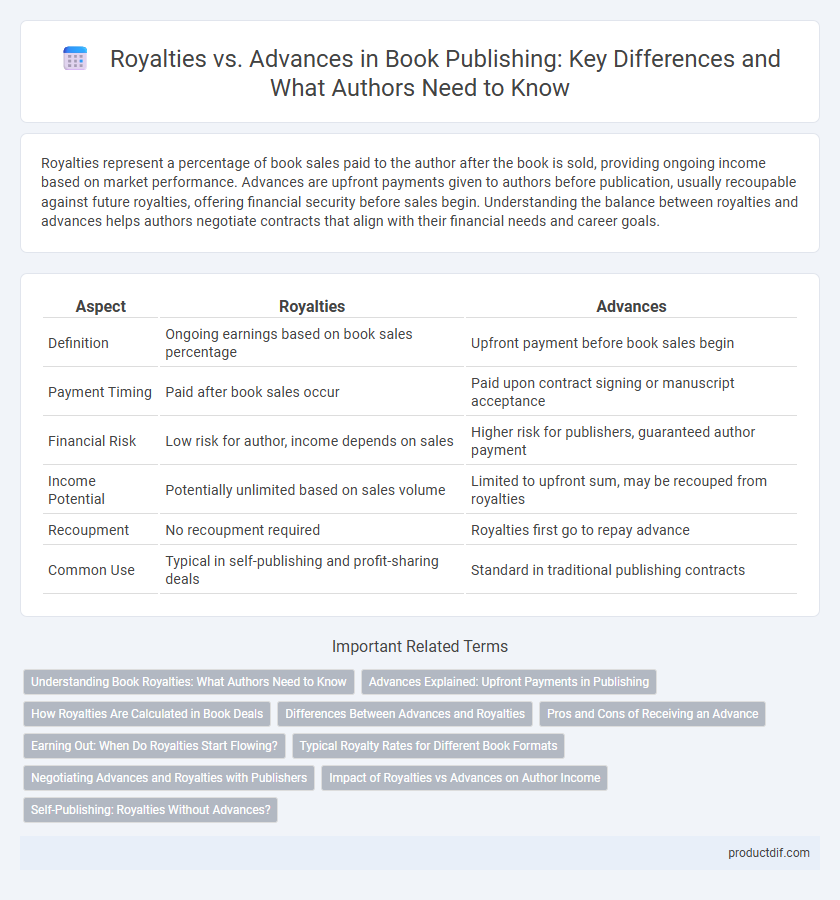Royalties represent a percentage of book sales paid to the author after the book is sold, providing ongoing income based on market performance. Advances are upfront payments given to authors before publication, usually recoupable against future royalties, offering financial security before sales begin. Understanding the balance between royalties and advances helps authors negotiate contracts that align with their financial needs and career goals.
Table of Comparison
| Aspect | Royalties | Advances |
|---|---|---|
| Definition | Ongoing earnings based on book sales percentage | Upfront payment before book sales begin |
| Payment Timing | Paid after book sales occur | Paid upon contract signing or manuscript acceptance |
| Financial Risk | Low risk for author, income depends on sales | Higher risk for publishers, guaranteed author payment |
| Income Potential | Potentially unlimited based on sales volume | Limited to upfront sum, may be recouped from royalties |
| Recoupment | No recoupment required | Royalties first go to repay advance |
| Common Use | Typical in self-publishing and profit-sharing deals | Standard in traditional publishing contracts |
Understanding Book Royalties: What Authors Need to Know
Book royalties represent a percentage of the book's sales paid to authors, typically ranging from 8% to 15% of the retail or net price depending on the publishing contract. Advances are upfront payments against future royalties, providing authors with income before book sales generate revenue, but these must be earned back before additional royalties are paid. Understanding the balance between advances and royalties helps authors negotiate favorable contracts and manage expectations about income streams from book sales.
Advances Explained: Upfront Payments in Publishing
Advances are upfront payments made to authors before their book sales generate revenue, serving as an initial earning guarantee. These payments are typically negotiated based on the book's projected market potential and help support the author financially during the writing and publishing process. Unlike royalties, which are earned as a percentage of sales, advances are paid regardless of the book's commercial success, but must often be earned back through future royalties.
How Royalties Are Calculated in Book Deals
Royalties in book deals are typically calculated as a percentage of the book's retail or net sales price, often ranging between 5% and 15%, depending on the publisher and format. Advances are upfront payments against these future royalties, meaning authors earn beyond their advance once royalties exceed its amount. The royalty rate can vary by sales format, such as hardcover, paperback, or e-book, with higher percentages commonly assigned to digital editions.
Differences Between Advances and Royalties
Advances are upfront payments given to authors before a book is published, serving as an initial investment against future earnings. Royalties represent a percentage of the book's sales revenue paid to the author after the advance is earned out. Unlike advances, royalties provide ongoing income based on actual sales performance rather than a fixed sum.
Pros and Cons of Receiving an Advance
Receiving an advance offers the advantage of upfront payment, providing financial security before book sales begin. However, advances may limit earnings initially, as royalties only start accumulating after surpassing the advance amount. Advances can also influence author motivation, with some writers feeling pressured to meet sales expectations tied to the advance size.
Earning Out: When Do Royalties Start Flowing?
Royalties start flowing after the author's advance has been fully earned out, meaning the book's sales have generated revenue equal to that initial payment. Advances are paid upfront as a guarantee, and royalties only kick in once those sales recoup the advance amount. Understanding the earning out threshold is crucial for authors to anticipate their income timeline from book sales.
Typical Royalty Rates for Different Book Formats
Typical royalty rates for books vary significantly depending on the format, with hardcover editions often commanding rates between 10% to 15% of the retail price. Paperback royalty rates generally range from 7.5% to 10%, while eBooks tend to offer higher royalties, commonly between 25% to 30%, reflecting lower production and distribution costs. Audiobooks usually provide royalties around 15% to 25%, influenced by whether they are sold through exclusive platforms or multiple retailers.
Negotiating Advances and Royalties with Publishers
Negotiating advances and royalties with publishers requires a clear understanding of industry standards, where advances typically range from 10% to 25% of expected sales revenue and royalties average between 8% and 15% of net or gross sales. Authors should assess the advance amount against the royalty rate to ensure fair compensation, especially if the advance is low but royalties are higher, or vice versa. Leveraging market data and comparable titles can strengthen negotiation positions, allowing authors to secure better financial terms and protect their long-term earnings.
Impact of Royalties vs Advances on Author Income
Royalties provide authors with a percentage of book sales, creating long-term income potential that scales with a book's popularity and market performance. Advances offer upfront payments that guarantee initial earnings but may limit immediate royalty income until the advance is earned back through sales. The balance between royalties and advances significantly impacts an author's financial stability and earning trajectory throughout their publishing career.
Self-Publishing: Royalties Without Advances?
Self-publishing authors typically earn royalties directly from book sales without receiving traditional advances, allowing for immediate income upon purchase. Royalty rates for self-published books often range between 35% and 70%, significantly higher than typical publisher royalties. This model offers writers greater control over earnings but requires upfront investment in production and marketing.
Royalties vs Advances Infographic

 productdif.com
productdif.com